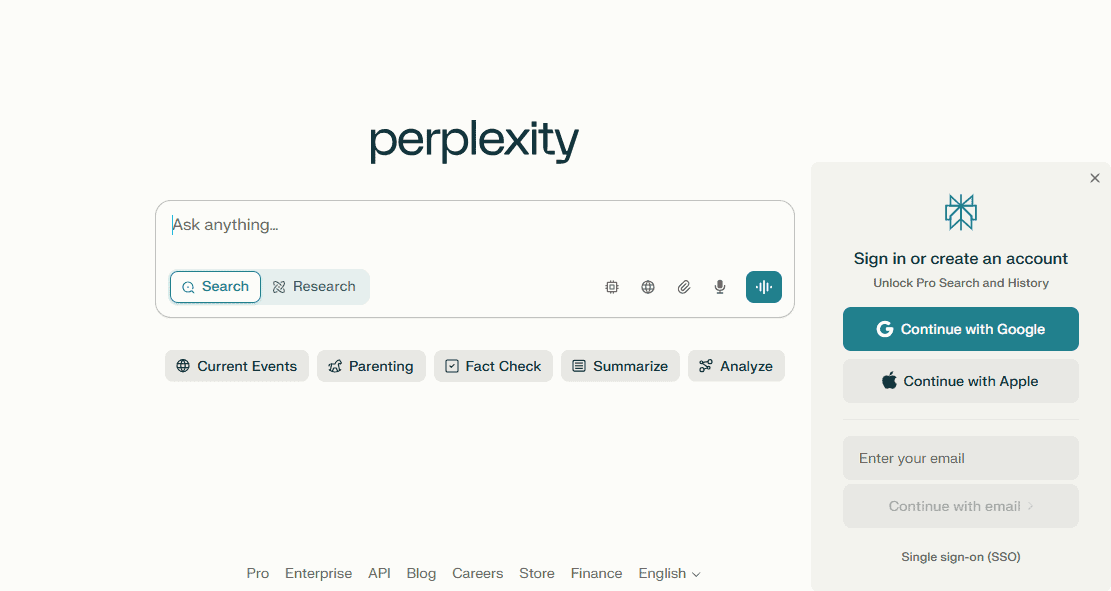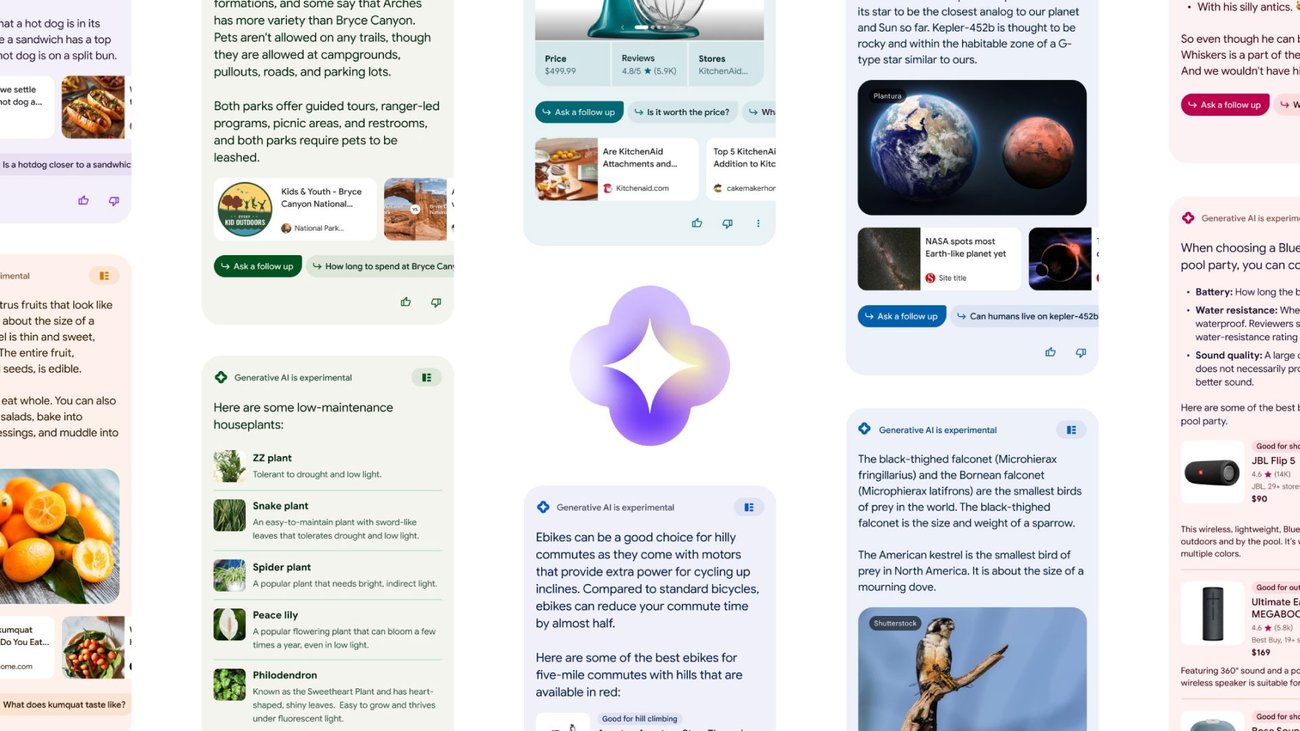AI is transforming how we search the internet. Instead of scrolling through endless blue links, today’s top AI search engines summarize the web for you, deliver real-time answers, and tailor results to your intent. Whether you’re deep in research, hunting for the best deals, debugging code, or just asking big questions, there’s now a specialized AI search tool for you.
The rise of generative AI has pushed companies like Google, Microsoft, and independent startups to rethink the very nature of web search. In 2025, users aren’t just typing keywords—they’re engaging in full conversations with intelligent systems that cite sources, adapt to follow-up questions, and work across formats (text, code, image, video).

Below is a comprehensive look at the best AI search engines this year, what each one excels at, and which is right for your needs.
Best AI Search Engines in 2025
| AI Search Engine | Best For | Key Features | Notable Downsides |
|---|---|---|---|
| Perplexity AI | Research + Citations | Real-time answers, source links, Copilot for topic deep dives | Can lack depth on obscure or niche queries |
| Google SGE | Familiarity + Integration | Blends traditional results with AI summaries at the top | Still in limited rollout; UX varies |
| You.com | Coding + Customization | Modular AI “apps” like YouCode, privacy mode, Chat & Search hybrid | Learning curve for interface |
| Bing Copilot | Microsoft Ecosystem | GPT-4 answers, image creation, Office and Windows integration | Ad-heavy interface |
| Andi | Simplicity + Visual Learners | Friendly UI, image cards, casual conversation flow | Not ideal for in-depth or technical tasks |
| Brave Search + AI | Private Search + Independence | Summarizer AI, no tracking, runs on independent index | Lacks polish compared to larger engines |
| ChatGPT (w/ Browse) | Complex Queries + Writing | Deep understanding, contextual dialogue, writing/code help, plugin support | Not ideal for breaking news or real-time facts |
| Neeva (legacy) | Ad-Free AI Search Pioneer | Summarized results, private by default, early model for AI-enhanced search | Discontinued in 2023 |
Overview
- Perplexity AI is the go-to for fast, cited answers. Ideal for research, it’s like Wikipedia meets Reddit—with sources.
- Google SGE is the natural evolution of Google Search, now offering AI snapshots above traditional results.
- You.com is a tech-savvy user’s playground, especially for developers using YouCode or data nerds doing focused analysis.
- Bing Copilot feels like ChatGPT built into search—useful if you’re in the Microsoft ecosystem or need multimodal tools.
- Andi is refreshingly minimal. It simplifies search into bite-sized cards, perfect for casual users or younger audiences.
- Brave Search AI is for users who care about privacy and want AI summaries—no tracking, no Google dependency.
Top AI Search Engines by Use Case
Best for Research & Citations
1. Perplexity AI
Strengths: Live web results, automatic citations, and contextual follow-ups
Use it for: Academic research, breaking news, technical topics
2. Google SGE
Strengths: Fast AI summaries, trusted sources, blends classic and new
Use it for: Product overviews, definitions, mixed-topic searches

Best for Coding & Technical Tasks
1. You.com (YouCode)
Strengths: Tailored modules for coding, math, and dev tools
Use it for: Code generation, debugging, API reference lookups
2. Bing Copilot
Strengths: GPT-4 integration, works well for multi-language coding
Use it for: Quick code snippets, script writing, command line help

Best for Shopping & Product Comparisons
1. Google SGE
Strengths: Shopping summaries, reviews, links to best prices
Use it for: Pros and cons at a glance, hands-free comparison shopping
2. Bing Copilot
Strengths: Product cards, image suggestions, brand comparisons
Use it for: Browsing tech gadgets, deals, and Amazon alternatives
Best for Big Questions or Conceptual Exploration
1. ChatGPT (with browsing)
Strengths: Multi-source synthesis, deep knowledge, nuanced discussion
Use it for: Philosophy, health topics, AI, writing assistance
2. Perplexity AI
Strengths: Shorter, sourced responses with solid factual grounding
Use it for: Quick summaries with footnotes to explore further
Best for Privacy & Independence
1. Brave Search + AI Summarizer
Strengths: No tracking, no Google/Bing backend, clean summaries
Use it for: Private, unfiltered results with light AI support
2. You.com (Incognito Mode)
Strengths: App-like controls, doesn’t log search history
Use it for: Search and chat while staying anonymous
Best for Teens, Students, and Casual Use
1. Andi
Strengths: Chat-like search, visual answers, safe search
Use it for: School questions, learning basics, visual learners
Final Word
AI search engines in 2025 are no longer experimental—they’re essential. Whether you want fast facts, deep dives, private results, or coding help, there’s now a purpose-built search engine to get you there. Instead of one-size-fits-all, AI search is becoming personalized, conversational, and highly contextual.
Want to keep exploring? Try testing a few of these side-by-side on your next search—you’ll quickly see how search is no longer just a box and a list of links.
1) Perplexity AI
Perplexity AI stands out as a free AI-powered answer engine that gives quick, accurate answers to any question. It searches the internet in real-time to find the most current information.
What makes Perplexity special is how it shows where it gets its facts. For each answer, it cites its sources, making it great for research and fact-checking.
The user experience on Perplexity is smooth and simple. You can use it on the web or through apps on iOS and Android devices. Just type your question, and it does the work.
Many users find Perplexity better than other AI search tools. In direct tests, it often beats competitors like ChatGPT Search in finding and presenting information.
The way Perplexity shows results is clear and easy to follow. Instead of just links, you get full answers with the sources clearly marked.
For students and researchers, Perplexity saves time by pulling together information from many places. No more clicking through dozens of websites to find what you need.
The service aims to change how people find information online. It combines the power of AI with internet searches to create something more useful than either one alone.
2) Google Gemini
Google Gemini has evolved from what was previously known as Google Bard. This AI search tool combines the power of Google’s search capabilities with conversational AI features.
Gemini can help with various tasks including writing, planning, and learning. Users can chat directly with the AI to get information or assistance with projects.
One of the main advantages of Google Gemini is its access to Google’s vast search index. This gives it an edge when providing up-to-date information on current events and factual data.
According to recent comparisons, ChatGPT performs better than Google Gemini for most text-based tasks and research. However, Gemini shows stronger results for creative tasks and image generation.
The interface is clean and user-friendly. You simply type your questions in a chat format and receive answers quickly.
Google’s massive data resources help Gemini provide relevant information across many topics. Users can ask follow-up questions to dig deeper into subjects.
Gemini integrates with other Google products, making it a convenient option for those already using Google’s ecosystem. You can access it directly at gemini.google.com.
While not perfect for every search need, Gemini represents Google’s answer to the AI search revolution. It stands as one of the mainstream AI chatbots that functions as a viable alternative to standard web search.
For users seeking a blend of traditional search capabilities with AI assistance, Google Gemini offers a balanced option from a trusted tech leader.
3) Microsoft Copilot
Microsoft Copilot is an AI companion that helps users find information, get entertainment, and find inspiration. It works as both a chatbot and a search tool that gives clear answers to questions.
Copilot has grown into one of the best AI alternatives to traditional search engines. Unlike standard searches that just show links, Copilot tries to give direct answers to what you ask.
You can find Copilot at copilot.microsoft.com. Getting started is simple and free, making it easy for anyone to try it out without paying anything.
One big plus for Copilot is how it handles search results. It combines AI answers with web links, giving users both quick answers and ways to learn more if needed.
Some users on Reddit have noted that Bing’s Copilot might be better than Google’s AI Overviews in certain situations. They mention that Copilot has an edge because users can turn off AI responses if they want to.
Copilot aims to be helpful in many ways. It can give advice, feedback, and straight answers to questions. This makes it useful for both simple searches and more complex questions.
Many experts count Copilot among the best AI chatbots of 2025, along with ChatGPT and other tools. What makes it stand out is its ease of use and free access.
The tool keeps improving as Microsoft adds new features and makes it smarter. This helps it stay competitive with other AI search options.
4) Komo AI
Komo AI stands out as a free AI-powered search engine that focuses on delivering quick and reliable information. Users appreciate that it shows results without ads, making the search experience cleaner.
The search engine uses AI to generate answers directly rather than just listing links. This approach saves time since users don’t need to click through multiple websites to find what they’re looking for.
For everyday searches, the Komo Search model works well. It excels at creating answers, ranking documents, and understanding what users are asking.
Komo offers a feature called Search Everywhere that helps users navigate through large amounts of information easily. This tool lets people interact with text as they read AI responses.
The search engine has gained enough popularity to be included in lists of top AI search engines alongside bigger names like Google and Bing. This shows its growing importance in the search market.
Komo’s main strength is its straightforward approach. It gives direct answers without the clutter of advertisements or unnecessary distractions that often fill traditional search results pages.
5) ChatGPT Search
ChatGPT Search represents a major upgrade to OpenAI’s flagship AI assistant. The feature now searches the web to provide timely answers with links to sources.
This feature marks a significant shift from the previous version’s knowledge cutoff limitations. Users can now ask about recent events or trending topics and get current information directly within the chat interface.
The search functionality works by pulling data from the internet in real-time. It presents answers in a conversational format while also citing where it found the information.
One key strength of ChatGPT Search is its integration with the existing conversational abilities of the model. This creates a seamless experience that blends factual information with helpful dialogue.
When comparing it to other AI search tools, ChatGPT Search holds its own but faces tough competition. In direct comparisons, some users found that Perplexity AI presented information better despite finding similar sources.
ChatGPT Search excels at understanding complex questions. The system can break down multi-part queries and address each component thoughtfully.
For users of the free ChatGPT tier, access to web search provides a substantial upgrade. This brings it closer to the functionality that paying Plus subscribers enjoy.
The tool sits among top contenders in the growing field of AI search engines. It competes directly with Microsoft’s Copilot and Google’s Gemini in this rapidly evolving space.
6) Google AI Overviews
Google AI Overviews brings a fresh approach to search by mixing traditional results with AI-powered summaries. This feature places AI-generated summaries at the top of your search results, giving you quick answers without digging through websites.
The system uses Google’s Gemini 2.0 technology working alongside their information systems. When you search for something complex, Google AI Overviews breaks it down into easy-to-understand chunks.
One key strength is that Google AI Overviews provides up-to-date information. Unlike some AI tools that have knowledge cutoffs, Google pulls fresh data from across the web.
Users enjoy seeing both the AI summary and traditional links on the same page. This gives them the best of both worlds – quick answers and the option to explore deeper.
Google recently expanded this feature into a full AI Mode for Search. This upgrade helps people search more easily with advanced AI capabilities.
The company aims to make search effortless while maintaining accuracy. They check facts carefully before showing them in AI Overviews.
Google AI Overviews appears in multiple reviews as one of the top AI search tools for 2025. It competes with other options like Perplexity, ChatGPT Search, and Bing AI.
The tool works across devices, including mobile phones through Google AI on Android. This helps users stay productive and find information quickly wherever they are.
7) Bing AI
Bing AI, now known as Bing with Copilot, represents Microsoft’s push into AI-enhanced search. This tool combines traditional search results with AI-powered answers and insights.
Microsoft has integrated its Copilot assistant directly into Bing search results. This creates a more helpful experience that goes beyond just listing websites.
The system can answer complex questions, summarize information, and present different viewpoints on topics. You can ask follow-up questions just like in a normal conversation.
One interesting advantage is that Bing allows users to disable Copilot responses if they prefer traditional search results. This flexibility gives users more control over their search experience.
Some users find that Bing’s Copilot might perform better than Google’s AI Overviews in certain situations. The quality of answers and the way information is presented can sometimes be more helpful.
Bing AI also includes creative tools. You can ask it to write stories, create poems, or help brainstorm ideas on various topics.
The search engine provides citation links for its AI-generated answers. This helps users verify information and explore topics more deeply if needed.
For visual searchers, Bing AI can process and respond to image-based queries. This feature helps when words alone aren’t enough to express what you’re looking for.
8) Neeva AI
Neeva AI was a search engine that focused on privacy and ad-free results. The company was founded by former Google executives who left in 2018 to create a different type of search experience.
Unlike most search engines, Neeva operated on a subscription model rather than showing ads. This approach allowed them to put users first without the pressure of advertising revenue.
Neeva stood out for its privacy-first approach with no trackers. Many users considered it to have the best search results after Google.
The company later added AI features to enhance their search capabilities. They combined traditional search with AI to give users more helpful answers to complex questions.
Neeva was particularly good for privacy-conscious users who wanted quality results without sacrificing personal data. It competed with other privacy options like Brave Search.
In 2023, Neeva announced they were joining Snowflake to help customers better use their data with AI and large language models. The original consumer search engine has since shut down.
Despite its short life as a consumer product, Neeva showed how AI and search could work together differently. The team’s expertise in search and AI continues to influence the industry.
9) Wolfram Alpha
Wolfram Alpha stands out from other search engines by using computational intelligence instead of just listing web results. It can solve complex math problems, analyze data, and answer specific questions with direct computations.
Unlike traditional search engines, Wolfram Alpha doesn’t just find information – it creates it through calculations. When you ask a question, it works out the answer using its vast knowledge base and algorithms.
Students and professionals rely on Wolfram Alpha for math, science, and other technical subjects. It shows step-by-step solutions for algebra problems and can visualize mathematical concepts clearly.
The search engine excels at data visualization and detailed analysis. This makes it perfect for researchers and anyone working with statistics or scientific data.
Wolfram Alpha’s accuracy is highly regarded in mathematical calculations. Many users find it more helpful than Wikipedia or Google for specific computational needs.
Some developers are working on combining Wolfram Alpha with ChatGPT to create even more powerful AI assistants. This could lead to tools that understand natural language but also perform precise calculations.
While Google gives broader information, Wolfram Alpha provides detailed answers for specific questions. It works best when you need exact data rather than general information.
The Wolfram Alpha website offers free access to its basic tools. More advanced features are available through paid subscriptions for those who need extra computational power.
10) You.com
You.com stands out as an AI search engine focused on workplace productivity. It offers users a personal AI search agent along with customized recommendations through its AI chatbot system.
One key advantage of You.com is its flexibility with AI models. Users can choose from 21 different AI models, including powerful options like GPT-4o, Anthropic’s Claude 3.5 Sonnet, and Meta’s Llama.
The platform allows for natural conversations with its AI. This makes it easier for users to find what they need without complex search terms or commands.
You.com has earned a spot among the top 5 best AI search engines to try in 2024. Its focus on helping with complex work queries sets it apart from other search tools.
The search experience on You.com aims to improve upon traditional search. It delivers more direct answers instead of just links, saving users time when researching topics or seeking information.
For professionals who need to handle complex information quickly, You.com offers tools that can summarize content and pull out key points from search results. This makes it useful for research, content creation, and information gathering.
Users looking for an alternative to mainstream search engines might find You.com’s approach refreshing. Its combination of multiple AI models with search functionality creates a more versatile tool than standard search engines.
Key Features of AI Search Engines
AI search engines use advanced technology to deliver more helpful and accurate results than traditional search engines. These tools combine several key technologies to understand what users want and provide better answers.
Natural Language Processing
Natural Language Processing (NLP) allows AI search engines to understand human language as it’s naturally spoken or written. This technology helps these systems grasp the meaning behind search queries rather than just matching keywords.
NLP helps Google’s AI Overviews understand complex questions and provide relevant summaries pinned above regular search results. The technology can pick up on context, slang, and even the intent behind your questions.
When you ask a question like “What’s the best tablet for drawing?” the AI understands you want comparison information about tablets designed specifically for artists, not just any tablet or drawing tools.
Modern NLP systems can:
- Understand questions in over 100 languages
- Recognize synonyms and related concepts
- Follow conversation threads across multiple queries
- Interpret the emotional tone of your request
Machine Learning Algorithms
Machine learning powers how AI search engines improve over time. These algorithms analyze patterns in data to make better decisions without being explicitly programmed for each scenario.
ChatGPT Search and Perplexity use machine learning to rank information sources and determine what’s most relevant to your query. The systems learn from billions of examples to predict what information will best answer your question.
These algorithms consider factors like:
- Content freshness and accuracy
- Source reliability
- User engagement patterns
- Query specificity
Machine learning also helps filter out low-quality or misleading content. By analyzing patterns across millions of websites, the AI can identify and promote trustworthy sources while downranking unreliable ones.
Personalization
AI search engines tailor results based on your past searches, location, and preferences. This personalization aims to provide more relevant information without requiring you to repeatedly specify your context.
Microsoft’s Copilot uses personalization to deliver different results to different users even when they enter identical queries. For instance, searching “best restaurants” will show options near your location, not just popular establishments worldwide.
Some personalization features include:
- Location-aware results
- History-based recommendations
- Device-specific optimizations
- Personal interest matching
Personalization works differently across platforms. Some AI search engines like SearchGPT let you choose how much of your data they use, while others automatically adjust to your behavior without explicit settings.
Impact of AI Search Engines on User Experience
AI search engines are changing how we find information online. These tools make searching easier and more helpful by understanding what users really want and giving quick, accurate answers.
Enhanced Search Accuracy
AI-powered search engines understand complex questions better than traditional search. They grasp natural language and the meaning behind queries instead of just matching keywords.
Users get more relevant results because these systems learn from past searches. This means fewer frustrating searches where you have to try different words to find what you need.
These tools can understand context and user intent. For example, if someone searches “apple nutrition,” the AI knows they want information about the fruit, not the tech company.
Many AI search engines now answer questions directly on the results page. This reduces the need to click through to websites, creating a “zero-click” search experience that saves time.
Faster Response Times
AI search engines deliver answers almost instantly, eliminating long waits for results. This speed helps users find information without losing focus on their task.
The conversational interface makes interactions feel more natural. Users can type questions as they would ask a real person rather than trying to create the perfect keyword combination.
Follow-up questions work seamlessly with AI search. The system remembers previous questions, allowing for natural conversation flow without starting over each time.
Mobile users benefit greatly from faster AI search responses. Quick answers are especially valuable when using phones on the go, with voice search making the process even more convenient.
Which AI search engine offers the best accuracy in search results?
Google Gemini typically provides the most accurate search results due to Google’s vast indexing capabilities combined with advanced AI.
For academic and fact-checking purposes, Perplexity AI stands out with its citation features and reliable information sourcing.
ChatGPT Search offers strong accuracy for general knowledge questions and is rated as having the best chatbot experience.
How does AI enhance the capabilities of traditional search engines?
AI search engines understand questions in natural language rather than just keywords. This lets users ask complex questions as they would to another person.
These tools can summarize information from multiple sources, saving time on research. Instead of visiting several websites, users get comprehensive answers in one place.
AI search engines also personalize results based on user preferences and past searches. They learn from interactions to improve future results.
Which are the most recommended AI search engines for academic research?
Perplexity AI is highly recommended for academic research due to its citation features and ability to draw from scholarly sources.
Google Gemini remains valuable for academic work because of its access to Google Scholar and ability to filter for peer-reviewed content.
Microsoft Copilot offers strong academic capabilities with its integration with Microsoft Academic and other scholarly databases.
Can you list AI-powered search engines that are free to use?
Most major AI search engines offer free versions with basic features. Google Gemini and Microsoft Copilot are free for standard use.
Perplexity AI offers a free tier with limited daily searches. Brave Search with AI features is completely free to use.
You.com and Andi also provide free AI search capabilities with optional premium upgrades.
What features distinguish the leading AI search engines from conventional search engines?
AI search engines provide conversational interactions unlike traditional keyword-based searches. Users can ask follow-up questions to refine results.
These platforms generate summaries and direct answers rather than just links. This saves time by eliminating the need to visit multiple websites.
AI search tools offer multimodal capabilities, allowing users to search with images, voice, or text. They can analyze complex queries and understand context better than conventional search engines.
Real-time information processing is another key feature. Many AI search engines can access and analyze current events and trending topics as they happen.







